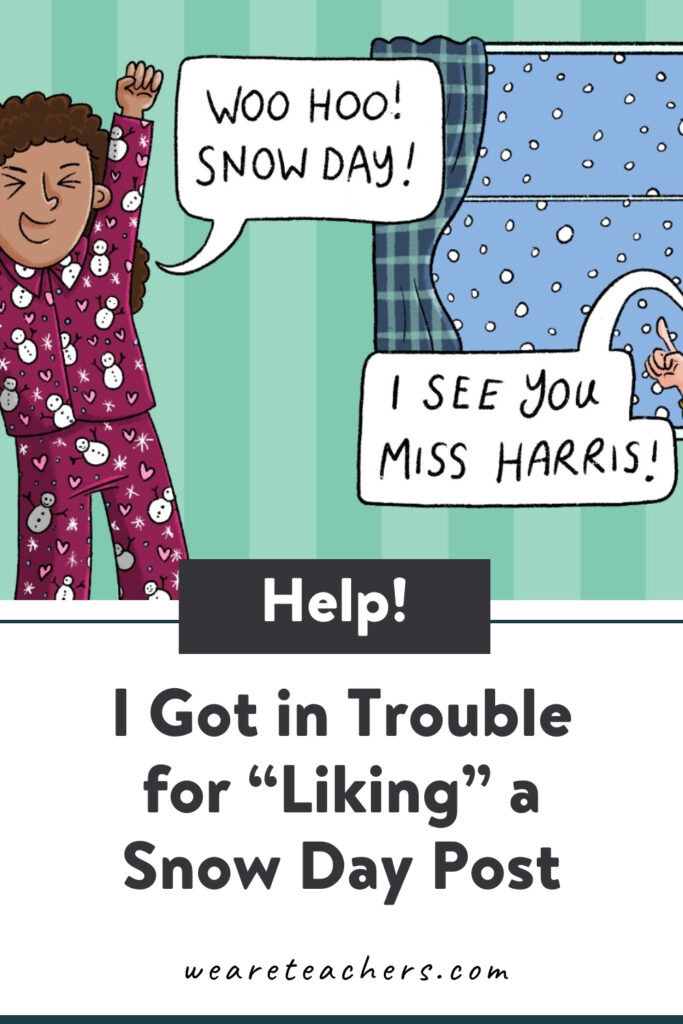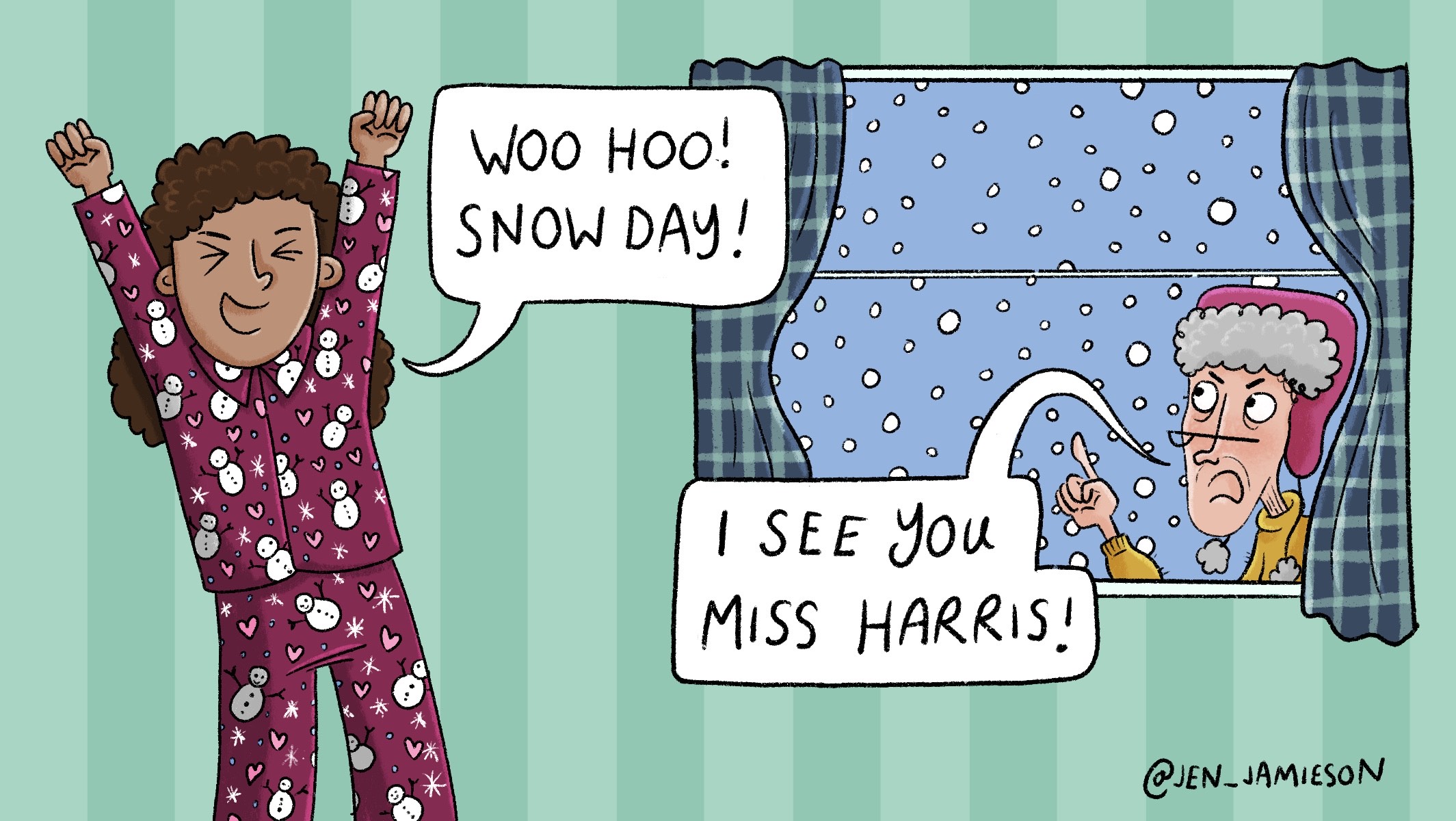Dear We Are Teachers,
Last week, I “liked” a tweet from our school district announcing that school was cancelled. I was at my own home. I was not on school Wi-Fi or using a school device. And yet, when I arrived at school on Monday, I had an email from my principal reprimanding me for my “unprofessional conduct” in liking the tweet. When I asked why liking the post was offensive, he emailed back that my thumbs-up “sent the message to community members that not having to do your job is something to be celebrated.” I’m so incensed I haven’t responded yet. Would you argue back or take this on the chin? It’s so petty!
—I’m, LIKE, NOT SORRY
Dear I.L.N.S.,
Though reading about this situation prompted an incredulous “WHAT?!” from me out loud, I would not argue back with this principal. First, this isn’t a disciplinary offense that goes on your record. Second, your principal sounds like a person who:
- Wouldn’t hesitate to throw you under the bus with parents or your superintendent
- Isn’t interested in the notion that teachers are human beings and thinks they should be benevolent, programmable robots whose needs are limited to a small charging station. Like a vacuum.
- Has not considered the Pandora’s box-esque ramifications of implying that employee likes = endorsements.
So, while I can think of certain principals I would absolutely rush to chat with about this, something tells me it wouldn’t go over well with your principal. Yes, this is unbelievably petty. Yes, your principal clearly needs bigger things to care about. But this level of micro-managing B.S. does not indicate to me that he has the emotional or intellectual intelligence for even the most reasonable negotiation.
Here’s what I would email:
“Thank you for your email. I meant my ‘like’ as a thank-you to the district communication team for notifying us, but I didn’t consider how the ‘like’ could be interpreted in other ways. I have a strong sense of pride and joy for my job, and I appreciate your heads-up that the optics might not match my intentions.”
Now find another principal to work for.
Dear We Are Teachers,
It’s my fifth year of teaching. I’m just now realizing that between student apathy, parent attacks, and a spineless administration, I’ve hated my job 2.5 of those years. This year, I just have no motivation. I’ve worked so hard at creating solid relationships, set firm boundaries, and yet I still feel drained. I have no drive to continue to make things better.
I made up my mind that I’d have to teach at least another two years because school helps pay for my master’s program. But recently, a friend told me he could help me get a job somewhere else (non-education-related) where I would be making a lot more money, not be as drained, and they would pay for the entirety of my last year in my master’s program (not just part of it). But when I think of leaving at the end of the school year, I feel terrible—like crying-and-tight-stomach terrible. Why do I feel so guilty? Do I keep teaching and give it one more year?
—Burned (OUT) to a crisp
Dear B.O.T.A.C.,
I’ll tell you why you feel guilty. Teachers have been conditioned to think that they are single-handedly responsible for children’s well-being. Schools and communities praise the overworked, martyr teacher. Parents and government systems leave us with impossibly huge gaps to fill. Then, they blame us when we say, “I can’t do it anymore.”
Stepping out feels like giving up. It’s not.
It sounds to me like you already know that leaving is the right move. Do you need someone to tell you you’re not a bad person for taking care of yourself? Let it be me: You’re not a bad person.
The one variable you may not have tried is switching schools. So, if you have the energy for it, interviewing at a few other schools with strong reputations might give you perspective. You may leave interviews saying, “Holy moly, this school sounds awesome. I think this place could breathe life into the embers of my teaching soul.” Or you may say, “This school sounds awesome but I just can’t imagine teaching being sustainable anywhere.” Eventually, that’s where I arrived. I was at my dream school and still couldn’t make teaching work. (Know there are plenty of teachers who can, though!)
Remember, too: This isn’t a permanent decision. Rather than, “I am leaving teaching,” tell yourself you’re trying something new. You can always come back after a break. I know a teacher who does a 4 years on–1 year off circuit.
There’s no wrong way to do what’s right for you.
Dear We Are Teachers,
I’m in my eighth year teaching a high school photography course. I have a class right after lunch that is mostly (16 out of 23) freshmen boys. Despite my best efforts, they totally control the class. They’re rowdy, totally disruptive, and feed off each others’ goofiness. I talked to my AP about it once, and he gave me a bunch of resources to improve my classroom management. But for the past eight years, I’ve been managing classes without issue! Is it ever the actual kids that are the problem?
—fed up with freshmen
Dear F.U.W.F.,
With total solidarity and respect here, I don’t think you’re even saying that the problem is the actual kids. In this case, it’s the situation of them all being together at once.
While we do have some tips on secondary classroom management and S.O.S. classroom management strategies you can implement the very next day, I think the best solution here is to get your administration involved. Especially at this point in the school year.
- Talk to your administrator again. Stress that this is the only class you’ve struggled to manage in the eight years you’ve been teaching. You may want to bring up the liability of their rowdiness in a room full of expensive camera equipment. Present your plan: A. Identify your rowdiest students. B. Notify parents that if their behavior continues, they will be pulled from photography and assigned an alternate elective. Make sure your AP signs off on this approach, because nothing is worse than an empty threat.
- Send the email to the adults of your rowdiest students. “Dear [adults], I’m emailing to notify you that [student]’s behavior in my class is disruptive to the learning of other students. He [give specific examples]. Additionally, [student]’s rowdiness is a liability for our photography equipment. For this reason, [AP name] has asked that if student behavior does not improve, [student] may be switched to an alternate elective based on which courses still have space. Please let me know if you have any questions.”
- Check back in with your AP in a week or so. Even if everything suddenly turns peachy, it’s good for your AP to know that his (minimal) involvement made a situation radically better.
All kids are good kids at their core. But not all kids need to be in the same class at the same time.
Do you have a burning question? Email us at askweareteachers@weareteachers.com.
Dear We Are Teachers,
My 3rd-grade partner teacher is out on maternity leave for the rest of the year. Her maternity leave sub is really struggling, and my AP has gradually been asking me to take on more and more responsibilities to help make sure her class is getting what they need. First it was meeting with the sub every day. Then, my AP asked me to teach a section of her class during my planning period so kids don’t fall behind in math. Now, after a parent raised a concern about grading, I’ve been asked to take over all the grading for this teacher! I was barely getting my work done as it is, and when I tried to point out that I really can’t make this work, my AP said to try to remember why I took this job and “at the end of the day, we have to do what’s right for kids.” Oh, he also said “June is just a few months away!” How do I stick up for myself without sounding like I don’t care about the kids?
—ONE JOB IS ENOUGH, THANKS


